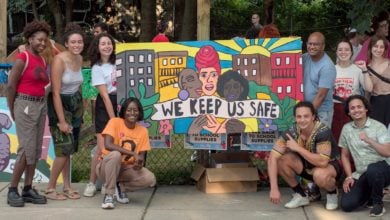Once we get past the distortions and
myths about socialism, it becomes immediately clear that a socialist
society would benefit the working class. The real question then, is
whether socialism can be established in the United States. Is this an
admirable but ultimately utopian goal, or is it something worth
fighting for?
While it is difficult to rationalize
the extreme injustices of the capitalist system, some argue that
socialism is not possible because a society without capitalists would
break down into chaos. To dispel this idea, we have to look at what a
capitalist really does.
The tiny capitalist class that controls
our society contributes nothing beneficial to it. If the
billionaires, the CEOs and the Wall Street bankers do not come into
the office, the productivity of the economy is unaffected. Although
they create nothing of value, they can amass tremendous wealth simply
because they own the means of production.
If we in the working class do not go to
work—such as in the instance of a strike—productivity comes to a
halt. That is because we create all the wealth of society and make it
run.
It is true that the capitalists
organize production, but they organize it on the basis of profit. As
a result, millions suffer from malnutrition while there is more than
enough food for every human being. Millions are homeless when there
is an abundance of unoccupied housing.
Workers are capable of
managing and organizing production, so we would be much better off
without the mismanagement of the capitalist class. Far from making it
impossible for society to function, the absence of a parasitic
capitalist class would make it possible to organize a society
centered on meeting human needs.
Economically feasible
Some people argue that socialism is
practical on a small scale, but could never work in a country as
large as the United States. In fact, the United States would be one
of the easiest places to establish socialism due to its level of
development.
Over the last century, in almost every
country where capitalism has been overthrown, the new socialist
government has had to deal with extreme underdevelopment and the
legacy of colonialism. A socialist United States, on the other hand,
would not have to worry about having enough housing, doctors or
productive capacity.
Although the wealth it generates is
controlled by a handful of capitalists, the U.S. economy is by far
the largest in the world. Few other places have such a diverse and
abundant supply of natural resources. Rather than having to grapple
with the difficult task of building up economic capacity, all that
would be required in the United States would be to put this existing
wealth to use for the benefit of working people.
Are the people capable of
revolution?
So, establishing socialism in the
United States is certainly economically feasible, but are the people
capable of making a revolution? Many academics, political
commentators and even some activists embrace an ideology of American
exceptionalism, arguing that the unique conditions of the United
States make the population particularly capitalist-minded,
individualistic and incapable of radicalization.
However, there’s a rich history of
working people rising up against oppression. It has simply been left
out of our school textbooks.
Immediately following independence from
Britain, hundreds of small farmers took up arms and joined Shays’
Rebellion against extortionist creditors in Massachusetts. In the
years between independence and the Civil War, major slave rebellions
broke out in Virginia, South Carolina and Louisiana.
As the Industrial Revolution
transformed production, huge strikes broke out. During the great
railroad strike of 1877, hundreds of thousands of workers across the
United States withheld their labor and brought the economy to a halt.
Armed uprisings were brutally suppressed by state and federal forces,
but workers briefly took control of parts of St. Louis and
Pittsburgh.
A strong socialist movement developed
around the turn of the century that won the support of millions of
workers. Communist and socialist parties led major strikes during the
Great Depression and organized the unemployed.
In the 1950s and 1960s, huge movements
against war and racism shook the capitalist state. The Civil Rights
Movement defeated Jim Crow segregation, while massive demonstrations
challenged U.S. imperialism. Mass women’s and LGBT movements
demanded equality. Revolutionary organizations like the Black
Panthers were formed that recognized the roots of these injustices in
the capitalist system itself.
While building class consciousness and
a revolutionary movement has never been easy—and in many ways was
set back in recent decades—poor and working people in the United
States are continuing this legacy of struggle today. In Wisconsin,
tens of thousands of workers participated in daily demonstrations and
occupied the state capitol building to protect their collective
bargaining rights. Massive demonstrations also took place in Ohio and
Indiana, and local demonstrations against budget cuts are taking
place across the country.
How will socialism come about?
There is revolutionary potential in the
United States, but that does not mean socialism will come about
naturally. It is inevitable that the contradictions of capitalism
will intensify and lead to greater and greater unrest. What’s not
inevitable is that this will lead to the establishment of socialism.
That requires the intervention of a
revolutionary party to unite different struggles under the
commonality that we are all poor, working-class and oppressed people.
Such an organization can only be built if veteran organizers continue
their dedication to this undertaking, and new generations of
activists are trained who will make revolution their life’s
calling.
Last year, the Party for Socialism and
Liberation issued a program, “Socialism and Liberation in the
United States.” It goes over our assessment of the situation
domestically and internationally and includes a list of specific
actions a socialist government would take. The PSL is a party of
action, and it needs you. It is not enough to attend conferences,
read a newspaper and be better informed. We need people who are ready
to stand up and join this struggle.
Ché Guevara said: “The revolution is
not an apple that falls when it is ripe. You have to make it fall.”
This is the task of our party and the revolutionary movement we hope
to build.






